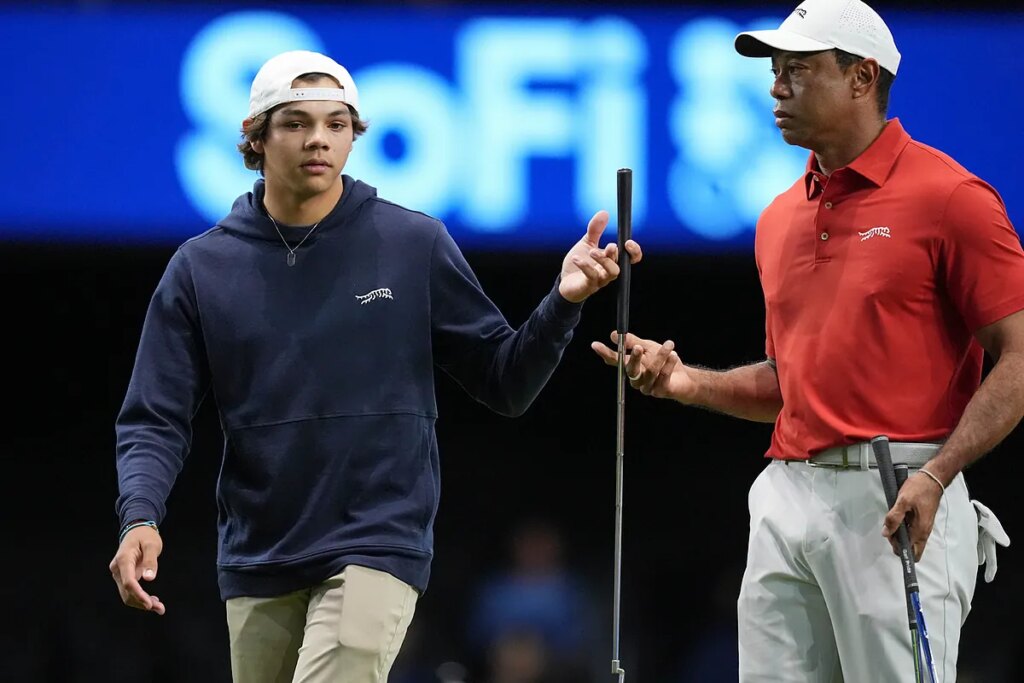At just 16 years old, Charlie Woods is navigating a world of expectations that most professional athletes don’t face until well into their careers.
As the son of golf icon Tiger Woods, Charlie competes not only against the field but also against a relentless wave of comparisons, fanfare, and pressure, all magnified by today’s hyper-connected media landscape.
This week, Charlie teed up at the prestigious North & South Junior Amateur Championship at Pinehurst Resort & Country Club in North Carolina. The tournament, a significant milestone on the junior golf circuit, was another step in his development.
Yet, unlike other junior competitors, Charlie’s every swing was tracked by cameras, and his group received featured coverage, a rare honor typically reserved for the tournament leaders. Even though Charlie wasn’t in contention early on, the Woods name alone drew media and spectator attention.
His performance started shakily with three consecutive bogeys in the final round, briefly pushing him outside the top 30. But Charlie showed resilience, posting a final-round 1-under 71 on Pinehurst No. 8 to tie for 12th place at 1-over for the tournament.
It was a commendable result considering the circumstances, but few 12th-place finishers would draw so much national focus.
The social media spotlight: A pressure tiger never faced
While Tiger Woods carved out his legacy in the 1990s under traditional media scrutiny, Charlie is growing up in a radically different era.
Constantly followed by camera phones, social media accounts, and viral expectations, Charlie faces a pressure that his father has acknowledged he never encountered.
“The type of attention is very different than what I had. We didn’t have social media. We didn’t have camera phones. We didn’t have any of that,” Tiger Woods reflected.
Earlier this year at the Cognizant Classic pre-qualifier in Hobe Sound, Florida, Charlie‘s round was derailed by chaos. Fans ignored ropes, followed him on the fairway, shouted during his backswing, and even chased after his golf ball.
One even tried to get him to sign a copy of his father’s book mid-round. Unsurprisingly, the distractions impacted his game, and he shot a 16-over 86, failing to advance.
This isn’t just about golf-it’s about managing a level of public intrusion that would test even the most seasoned pros. Charlie continues to show grace under pressure, but the environment he competes in is anything but normal for a teenager.
Other legacy kids know the struggle
Charlie isn’t alone in this experience. John Daly II, son of two-time major winner John Daly, shared a similar sentiment on the Identity Sports Podcast.
“Everybody just puts Charlie in this category that not many people get to until they are 20, 21, or 22,” Daly Jr. explained. “He’s just a kid; he wants to have fun, I guess… I think people expect way too much of him for his age right now.”
Daly Jr. knows firsthand how unfair comparisons and public expectations can derail a young athlete’s confidence. Like Charlie, he was often judged not by his own progress but by the towering reputation of his father.
Despite the setbacks and the noise, Charlie Woods continues to improve. He’s shown poise in elite junior tournaments and has already demonstrated the kind of mental toughness that suggests a promising future in golf.
But that journey will only be sustainable if fans and media alike allow him the space to be a teenager first-and a golfer second.
Tiger may be the greatest of all time, but Charlie is writing his own story. Whether that ends up in the professional ranks or elsewhere, he deserves to play the game on his own terms, free from the impossible expectations cast by a surname that forever changed golf.
Read the full article here

